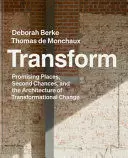
- Editorial:
- MONACELLI
- Año de edición:
- 2023
- Materia
- Música
- ISBN:
- 978-1-58093-608-8
- Páginas:
- 224
TRANSFORM
ARCHITECTURE OF ADAPTATION
BERKE / DE MONCHAUX
u003cbu003eA guide to contemporary architecture practice in one of the most important fields todaythe transformative adaptation of existing buildings. A manifesto and survey of contemporary practice by one of the leading offices in this domain, Deborah Berke Partners.u003c/bu003eu003cbru003eu003cbru003eFor over 30 years, Deborah Berke Partners has been a leader in transforming old buildings for new futures. u003ciu003eTransform: The Architecture of Adaptation u003c/iu003ewill explore and document the ecological and urban imperative to revive and adapt existing built fabric, and it will demonstrate innovative and timeless tools and methods for creating successful new architecture out of old structures and found conditions. The book will be illustrated primarily, but not exclusively, with projects by Deborah Berke Partners, including academic buildings, boutique hotels, and community and cultural centers. Essays by Deborah Berke, Noah Biklen, Arthi Krishnamoorthy, and Alan Brake introduce each chapter. It will also include contributions by critics, planners, and artists with a shared interest in creating a sustainable, equitable, and enriching urban environment. Contributors include artist Titus Kaphar, urban history scholar Karen Seto, environmenal design leaders Atelier Ten, and photographer Christopher Payne.u003cbru003e u003cbru003eThe term adaptive reuse is bland and imprecise. It implies a lack of rigor, as if old buildings were discarded objects that can easily be repurposed, like a turning an old milk crate into a bookshelf. Buildingsgood ones, bad ones, whether designed by a famous architect, or without an authorare complex things, with histories, with impacts on their surroundings, with relations to people and places. They do not all deserve to be saved, but many do. Sometimes an unremarkable building can be transformed into something better than it ever was. Even good buildings by noted architects can be improved upon, especially if their use has changed or if their context has been significantly altered.u003cbru003e u003cbru003eIn much of the country, particularly small to mid-sized, post-industrial cities, opportunities abound for the creative reuse of existing buildings. Deborah Berke Partners approaches these buildingsold warehouses, office buildings, even a historic sanatorium designed by H. H. Richardsonas material resources and as the foundation of sustainable urban redevelopment. These projects have impacts that extend far beyond their wallsthis work is part of an urgent rethinking of American urbanism.u003cbru003e







